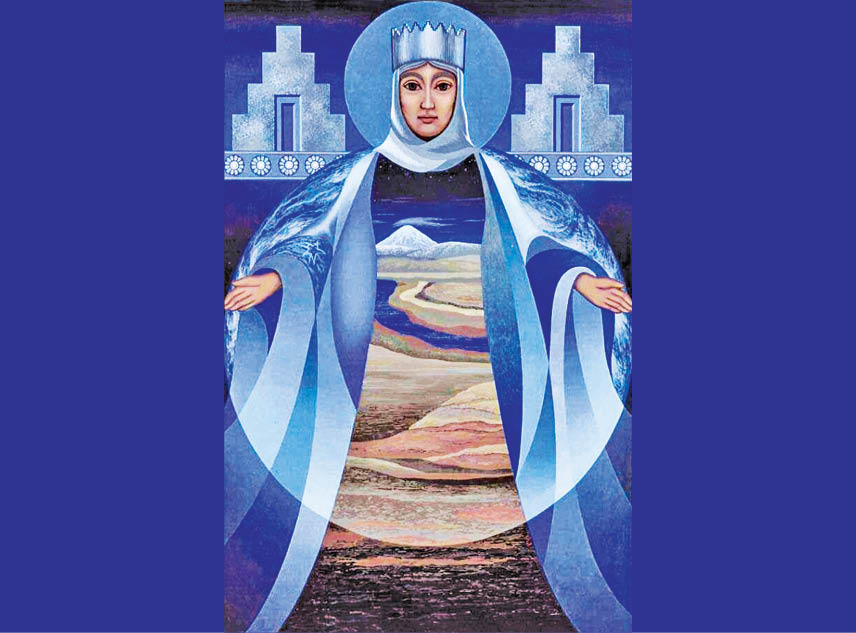Aspandarmad or Spendarmad is the twelfth and last month of the Zoroastrian calendar. It is dedicated to Spenta Armaity – the divinity presiding over Mother Earth. While the term ‘Spenta’ can be variously translated as ‘increasing, growing, good, holy and benevolent’, the term ‘Armaity’ can also be variously translated to mean ‘devotion, piety and peace’. Spenta Armaity is an Amesha Spenta that advances peace and piety in this world – little wonder that she’s constantly referred to in the Gathas!
Our religious traditions call for Zoroastrians, on awakening in the morning, to recite one Ashem and offer salutation to Spenta Armaity, by touching the ground and then the forehead three times. This is to seek both – forgiveness and blessings. Forgiveness is sought at the start of the day for all acts which may be committed knowingly or unknowingly that may burden the earth.
By way of blessings, the devotee aspires for Spenta Armaity’s qualities of devotion, peace and piety. The earth patiently carries all burdens calmly and quietly. It converts even waste, like dung, to useful fertilizer. Just as Spenta Armaity converts all the negative to positive, the devotees also hope and pray that they convert the negatives in their lives and in the world, to something positive, good and useful.
Since 1970, the world has celebrated ‘Earth Day’ on 22nd April. But for centuries, us Zoroastrians have celebrated ‘Aspandarmad Roj of Aspandarmad Mah’ as ‘Earth Day’. It’s the original and perhaps the world’s first ‘Earth Day’! Every year, on the Aspandarmad Parab, Zoroastrian priests write the Nirang of Aspandarmad, which devout Parsis paste on the front entrance of their homes. This Nirang, believed to ward of all forces of evil, is written as follows:
“Pa nam is Dadar Hormazd!
Roj Spendarmad, Mah Spendarmad, bast hom zafr I hama khrafastaran, devan, drujan, jaduan, parivan, sastaran, kikan, karpan, vanahkaran, duzdan, gorgan, stahmakan, pa nam i yazad, pa nam i tag Faridun, pa nam i tishtar stareh, pa nam i Satavas, pa nam i Vanant stareh, pa nam I oshan starekan Haftoring!
Ashem Vohu……..”
Translation: “In the name and with the help of Dadar Ahura Mazda!
On the day Spendarmad of the month Spendarmad, with the help of the Yazads, Faridun, the holder of Tagi, with the help of the stars Teshtar Tir, Satayas, Vanant and Haftoring, I hereby bind the mouths of all Devs, Khrafastars, Druji holders, magicians, evil fairies, evil power users, the willfully deaf and the willfully blind, evil doers, thieves, wolf-like men and tormentors.
May the Ashem Vohu help me do this!”
The last 10 days of the Zoroastrian calendar (i.e., Roj Astad to Aneran and the independent five days of the Gathas), are considered very holy, as doctrinally it is believed that during this period, the fravashis of the righteous dead, come down from their spiritual world into this material world and bless all those who remember and pray for them.
During the Fravardegan or Muktad days, Parsis offer special prayers for the fravashis of their dearly departed. The fravashi or farohar is the divine essence, which is wholly pure and good. It is not to be confused with the ruwan or soul. The Avestan word ‘fravashi’ comes from the word ‘Fra’ (to take forward) and ‘vaksh’ (to grow). In other words, fravashi is that spiritual essence or power that takes every good creation of Ahura Mazda forward and helps it to grow.
Fravashi is also a prototype, which is believed to have existed before the material creation. Even Ahura Mazda and His Divine Energies, the Amesha Spentas and the Yazatas, are said to be having their own fravashis. Plants, animals, mountains and rivers also have their own fravashi. They are guardian spirits of the souls of the dead and protect and guide the souls of the living, as well.
The Muktad or fravardegan days essentially center around the family, and until a few decades ago, were observed largely at home. But with urbanization, small flats and difficulty in observing ritual purity at home, the focus shifted from the home to the fire temple. However, with the ongoing Pandemic relegating us home-bound, many have been observing these holy days at home again.
- Customs To Observe At Atash Behram Or Agyari - 13 April2024
- A Shower Of Spring Festivals - 6 April2024
- Significance Of Eggs, Bunny, Bread, And Fire During Easter! - 30 March2024
